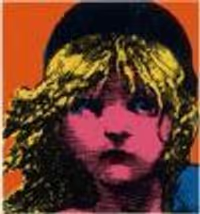Les Miserables Film Script Released (?)
#100Les Miserables Film Script Released (?)
Posted: 10/22/12 at 12:00am
Deleted
#101Les Miserables Film Script Released (?)
Posted: 10/22/12 at 8:46pm
deleted
Updated On: 10/22/12 at 08:46 PM
#102Les Miserables Film Script Released (?)
Posted: 10/23/12 at 10:02amI am hoping they make a coffee table book with the script and lots of pretty pictures as they have with all the other recent movie musicals.
#103Les Miserables Film Script Released (?)
Posted: 10/23/12 at 1:25pm
"I Dreamed a Dream" is absolutely perfect where it is in the stage version. Thinking of placing it after "Lovely Ladies" on stage is the worst idea ever.
It just doesn't make sense that just seconds after Fantine had lost her job, she's already crying about how hopeless she is and how much her life sucks. I get that in those times, finding another job is nearly impossible, but judging by how powerful and emotional the song is, she just overreacted a bit too soon.
That's why placing I Dreamed a Dream AFTER Lovely Ladies is such a genius idea. Because she had already faced many obstacles like selling her hair, prostitution, poverty. That's just enough for anyone to break down and lose their dignity.
Phyllis Rogers Stone
Broadway Legend Joined: 9/16/07
#104Les Miserables Film Script Released (?)
Posted: 10/23/12 at 2:19pmYou're not gonna like the movie, though, because of all the wigs.
#105Les Miserables Film Script Released (?)
Posted: 10/23/12 at 2:22pm
"I Dreamed a Dream" is a bit of a strange song. It's really more about Fantine being abandoned by Tholomyes than about her being sacked (which is why I hate the new 25th anniversary staging in which Fantine is portrayed as simply angry at having lost her job), but it ends with a complete disillusionment ("Now life has killed the dream I dream") which makes it straddle the beginning and near end of Fantine's story before the end has actually happened.
The most important line in that song, IMO, is "I dreamed that love would never die." There are certain singers (Laurie Beechman, comes to mind -- look for the recording of her performance on Youtube; as does Canadian singer-songwriter Allison Crowe) who are able to imbue that one line with hours worth of exposition. A performer's understanding of that one line makes or breaks their interpretation of that song for me.
By that point in the story, Fantine is already worn down. She had already aged quite a bit by the time she leaves Cosette with the Thenardiers. Even with her job, she had been struggling to meet the Thenardiers exploitative demands, and was living in constant fear that her child would be discovered. Then the indifference and coldness with which her fellow factory workers turn against her in such a vulnerable place compounds the sense of aloneness and abandonment by love, and by society. She hasn't quite reached her breaking point (that happens when she becomes a prostitute), but it's the beginning of the end for her.
That said, I think the new placement for the film will work just as well. It makes more sense of the "Now life has killed the dream I dreamed" which seemed a bit hyperbolic in the original place.
Updated On: 10/23/12 at 02:22 PM
Videos




